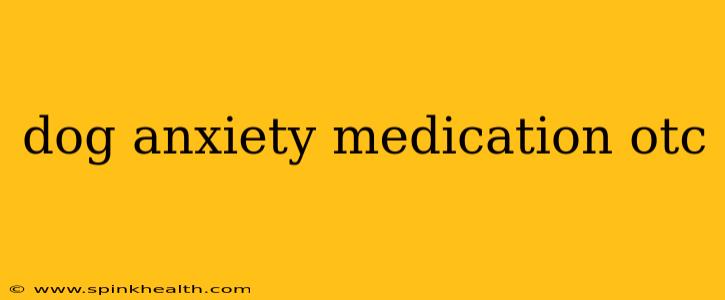Dealing with a dog experiencing anxiety can be heartbreaking for any pet owner. Watching your furry friend tremble, pant excessively, or hide is distressing, and you naturally want to find relief. While a veterinarian's diagnosis and prescription medication are crucial for severe anxiety, many pet owners wonder about over-the-counter (OTC) options for milder cases or as supplemental support. This guide explores what's available, what to expect, and when to seek professional veterinary help.
My name is Sarah Miller, and I've been a veterinary technician for 15 years. I've witnessed firsthand the challenges pet owners face managing anxiety in their canine companions. I understand the search for solutions and the desire to provide the best possible care. This article reflects my experience and aims to provide accurate, compassionate information.
What OTC Medications Might Help with Dog Anxiety?
Let's tackle the elephant in the room: there isn't a single, universally effective OTC medication specifically designed to treat dog anxiety. Many pet owners incorrectly assume certain human medications will work, but this is extremely dangerous and should be avoided. Giving your dog human medication without veterinary consultation can have severe, even fatal consequences.
However, some OTC products might offer limited relief for mild anxiety in specific situations. These usually focus on calming the dog through different mechanisms, not directly targeting the underlying anxiety.
Can I Use Melatonin for My Anxious Dog?
This is a frequently asked question. Melatonin is a hormone that regulates sleep, and some pet owners use it off-label to help their dogs relax. While seemingly harmless, its effectiveness for anxiety is questionable, and the dosage for dogs needs careful veterinary consideration. Never administer melatonin without consulting your vet. They can determine if it's appropriate and advise on the correct dosage. Overdosing on melatonin can lead to adverse reactions.
What About Calming Supplements for Dogs?
The pet supplement market offers a variety of calming products containing ingredients like chamomile, valerian root, L-theanine, and tryptophan. These are often marketed as natural anxiety relievers. While these ingredients may have calming properties in some dogs, their efficacy is not consistently proven, and quality control can vary significantly among brands. Always choose reputable brands with third-party testing to ensure product purity and potency. Again, consult your veterinarian before using any supplements. They can advise on potential interactions with other medications or underlying health conditions.
Can CBD Oil Help My Anxious Dog?
CBD oil, derived from hemp, has gained popularity as a potential anxiety treatment for dogs. However, the research on CBD's effectiveness for canine anxiety is still limited, and the quality of CBD products varies greatly. Look for products with third-party lab testing results showing the CBD concentration. It's absolutely crucial to discuss CBD oil with your veterinarian before using it, particularly if your dog is on other medications. CBD can interact with certain drugs.
When Should I See a Vet About My Dog's Anxiety?
If your dog exhibits significant signs of anxiety, such as:
- Excessive barking or howling
- Destructive behavior
- Pacing or restlessness
- Inappropriate elimination
- Withdrawal or hiding
- Aggression
- Tremors or excessive panting
You should schedule a veterinary appointment immediately. Your veterinarian can perform a thorough examination, rule out underlying medical conditions that might be contributing to the anxiety, and recommend appropriate treatment options. This might include prescription medications, behavioral modification techniques, or a combination of both.
What are the Different Types of Anxiety in Dogs?
Dogs can experience various forms of anxiety, including:
- Separation anxiety: Distress when left alone.
- Noise phobia: Fear of loud noises (thunderstorms, fireworks).
- Generalized anxiety disorder: Chronic, pervasive anxiety.
- Social anxiety: Fear of other dogs or people.
- Travel anxiety: Distress during car rides or other forms of travel.
Understanding the type of anxiety your dog faces helps your veterinarian develop a tailored treatment plan.
How Can I Help My Anxious Dog at Home?
In addition to any medication prescribed by your veterinarian, you can implement several strategies to help ease your dog's anxiety at home:
- Create a safe space: Provide a quiet, comfortable den where your dog can retreat when feeling stressed.
- Regular exercise: Physical activity can help burn off excess energy and reduce anxiety.
- Positive reinforcement training: Reward calm behavior.
- Environmental enrichment: Provide toys, puzzles, and opportunities for mental stimulation.
- Avoid triggers: Identify and minimize exposure to situations or stimuli that exacerbate anxiety.
Remember, managing dog anxiety often requires a multi-faceted approach. A veterinarian's guidance is vital for ensuring your dog's safety and well-being.
This information is for educational purposes only and should not be considered a substitute for professional veterinary advice. Always consult with your veterinarian before making any changes to your dog's care, including introducing any new medications or supplements.

